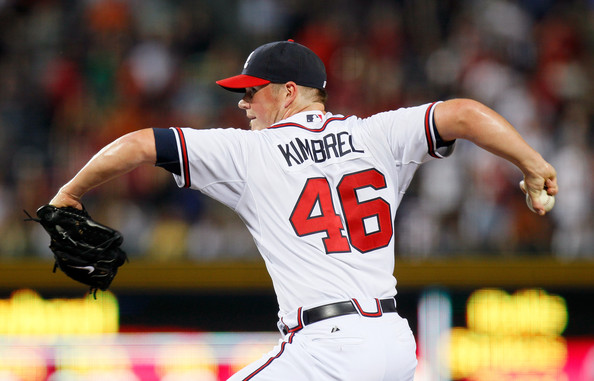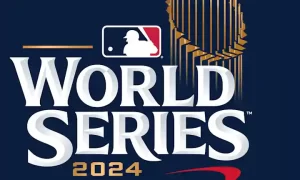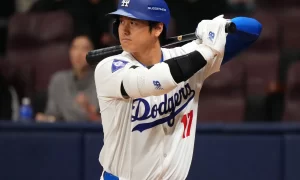The Atlanta Braves announced a series of extensions this week that promise to keep their young players hearing the Chop for the next few seasons. Having already addressed the position player group with extensions to Freeman and Heyward, the starting pitching was shored up with an extension to Julio Teheran. The Braves announced just this morning that their bullpen will continue to be anchored by Craig Kimbrel for the foreseeable future. I’ll address each of the extensions in time, but know that as a fan of the Braves, I’m happy that these young studs will be in Atlanta Georgia a while longer.
Not too long ago, I began my campaign to fire “ESPN Insider” Jim Bowden. His analysis is often off base, his writing is grey and mindless, and the topics he chooses to write about offer little to the greater baseball discourse. Previous OTB campaigns to fire people– notably a 2011 attempt to rid the world of Suzyn Waldman–have met with little success, so Bowden may well be sitting pretty, but his commentary on my Braves this past week was so terrible that it forced me to resurrect the effort to get him axed.
What follows in italics is Bowden’s writing, with my comments interjected in plain text.
When the Atlanta Braves signed first baseman Freddie Freeman to an eight-year, $135 million extension recently, I loved the deal.
I didn’t. Neither did this, this, this, this, this, or this author. Freeman even sounded humbled and surprised that the Braves offered him so much money: “For them to believe in me with this kind of contract is truly an honor, humbling, but to happen this young, I never thought it would be even possible….But I’m happy!”
Here was a team taking the expected revenue from the new stadium it will soon have and locking up a young position player who not only has a track record of success, but also has shown steady improvement.
Am I the only one who thinks it might be a bad financial strategy for the Braves to already be spending money from revenue that isn’t guaranteed from a stadium that hasn’t been built or designed yet?
The deal continued the trend of teams locking up promising young players before they hit free agency in order to better control cost, and it also recognizes that salaries are only going to keep increasing along with revenues.
While Bowden is correct that there has been a trend for teams to lock up their young players, the Freeman deal represented a market correction. The other players in this supposed “trend” all signed decidedly team friendly deals. If Dave Cameron says this is a different kind of deal–the kind that could change how other players negotiate their extensions–then, Mr. Bowden, it seems to break the mould, or start a new one, rather than continue in line with an existing trend.
With that in mind, I can see why the Braves chose to give right-hander Julio Teheran a six-year extension — reportedly worth $32.4 million — with a team option for 2020, but I think Atlanta should have waited a little longer before locking up Teheran, and I question the decision to sign him now.
Unlike Freeman, Teheran does not have much of a track record. Freeman was a very good player in 2011 and 2012, and was an MVP candidate in 2013 at the age of 23. Teheran, on the other hand, has had an up-and-down pro career. He always was considered an elite prospect because of his stuff, but he posted a 5.08 ERA at Triple-A in 2012, and there were lots of questions about his future.
This is so awful that I don’t know where to start. I probably waited too long to interject, but sometimes it’s fun to see Bowden be so terribly wrong in so many sentences back to back. By locking Teheran up early, the Braves were able to avoid the same $100 Million type commitment that Freeman commanded. By waiting until a player is established as an MVP candidate, teams lose much of their leverage in negotiating long-term deals. That isn’t rocket science, Jim.
As for the idea that Teheran has had an up-and-down pro career? His poor 2012 is the one “down” on an otherwise “up” rap sheet. Whenever a promising prospect has a down year, I’m always suspicious that the results could be thanks to a hidden injury. I couldn’t find any notes on a Teheran injury, but apparently the Braves tinkered with his mechanics in 2012, before changing their mind and returning to the “more natural” style. The point is: Bowden’s reason for being tentative about Teheran’s long-term potential is the same type of logic that has lead to him being fired as GM–twice. Back to Bowden, the “Insider”…
He answered a lot of those questions in 2013, when he posted a 3.20 ERA in 185 2/3 innings for the Braves, while averaging almost a strikeout per inning. His command was noticeably better than in previous seasons (2.2 walks per nine), and you could see the makings of an elite starter. That said, the 23-year-old’s track record is extremely limited, and as we all know pitchers are much more of an injury risk than hitters.
But the biggest reason for the Braves to wait to do this deal is that there was no rush.
So…. deals should only be done in times of necessity?
Teheran is not eligible for arbitration until after the 2015 season, which means he would have been playing for basically the minimum the next two seasons.
The whole point of these deals is that teams commit more up front to save in the long term.
Braves GM Frank Wren easily could have waited until after this season before pulling the trigger on a move like this.
He also could have waited until after the season to go on a cruise, or purchase a new pair of Crocs.
Even if Teheran has a great season, he’d still be a year away from arbitration and four years from free agency. Yes, he’d gain a little leverage in negotiating a long-term deal,
THAT IS WHY YOU DO THESE DEALS.
but the Braves would still have been in position to sign him to a team-friendly contract. And in such a scenario the Braves would have a lot more evidence of the kind of pitcher Teheran could become.
While the Freeman deal was for a lot more dollars, the longer track record and the fact that he is not a pitcher means the deal doesn’t carry a ton of risk.
Some expert reporting. “A lot more.” “A ton of risk.” Here’s a quiz: How much does a ton of risk weigh? If I challenge Bowden to a game of Risk, (“the game of world domination”), and beat him, can I get his job? ESPN could televise the Risk bout on ESPN2 instead of the World Series of Poker.
The Teheran deal is a lot more risky from where I’m sitting, and the Braves have left themselves very vulnerable if Teheran gets hurt or turns out not to be as good as his 2013 season suggested.
Where do I think Bowden is sitting? For some reason, I can’t get the image of Bowden riding a sad polar bear on a small Caribbean island out of my head. And now, neither can you.
Sadly, Bowden’s article is over and I haven’t enlightened my audience with golden nuggets of Braves wisdom. For an idea of what I thought the Heyward and Freeman extensions would look like back in December, look here.
I liked the Teheran deal because it includes a club option year for the Braves that could buy out one of Teheran’s free agent years. The rest of the deal pays Teheran about what you would expect a burgeoning young No. 2 starter to be paid through arbitration, but could buy out two of his free agent years for $12 Million apiece. That’s good news.
The Freeman deal looked like a bit of an overpay. I’m concerned that the Braves are paying too much for clutch hitting and that Freeman’s .319 average will be a high mark. Freeman is too good of a natural hitter to make this deal look awful upon it’s completion, but committing over $100 Million to a player who could be good-not-great over the life of the contract, doesn’t make much sense to me.
Kimbrel’s deal is necessitated by the sheer dominance of his first three years, but I’m worried about the percentage of future payroll that the Braves have earmarked for Kimbrel’s bank account. Assuredly they have decent idea of the amount of increased revenue from their new stadium, but one has to be wary of the fuzzy accounting that has proven a hallmark of stadium deals.
The biggest story from all this is that the Braves offered Jason Heyward just two years. Heyward has had an up-and-down career because of injuries, and pegging a value for the dynamic outfielder is difficult. I would have liked to see the Braves invest slightly more in Heyward on the hopes that he is able to make the leap and become an MVP candidate and be kept for cheap. Still, one understands their hesitance in committing big money/years to a player who is close to earning an injury prone label.
In recent years, the Braves brass have seen significant turnover in their roster. By my count, they will start this year with just 7 players still around from their 2011 Opening Day lineup. Gone are Chipper Jones, Bobby Cox, and Brian McCann. The young players who’ve replaced those icons are here to stay. Freeman will hit, Teheran will chuck it, and–sans Mo–Kimbrel will enter 2014 as the best closer in the game. As things stand, fans should be excited about a lot of meaningful baseball in the coming years. If Jim Bowden were making the decisions in Atlanta, I doubt things would look this good.
-Sean Morash
Stat of the Day: According to the Atlanta Braves website, Tom Glavine batted fourth on Opening Day 2008.


















